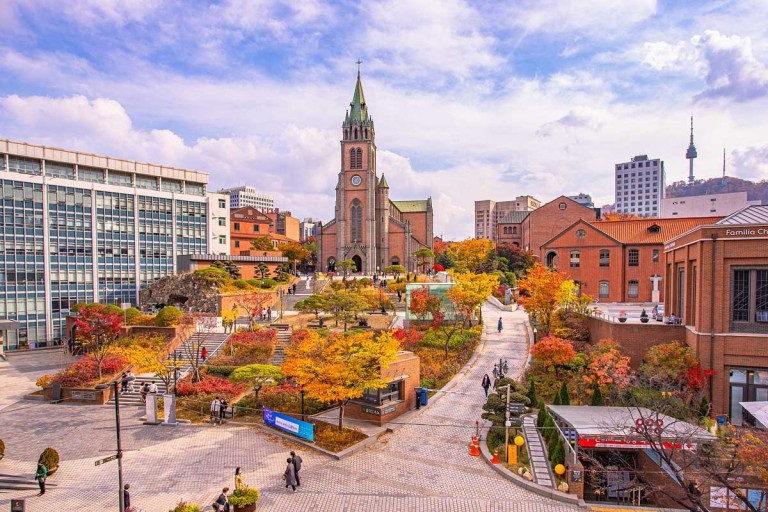10 Unique Aspects of Korean Culture That Set It Apart from Other Countries
10 Unique Aspects of Korean Culture That Set It Apart from Other Countries
Introduction:
Korea, with its rich history and vibrant customs, has a culture that is distinct from the rest of the globe. Korea offers a unique experience that captivates people from all over the world, from its unique customs and etiquette to its excellent cuisine and lively entertainment industry. In this blog article, we will look at ten features of Korean culture that distinguish it from other cultures.
Hanbok is traditional Korean clothing.
Hanbok, or traditional Korean apparel, is a gorgeous and exquisite garment that displays the country's cultural past. Hanbok is worn on important events and festivities because of its brilliant colors and beautiful lines. Unlike the Western sense of formal attire, hanbok is more casual and easy, accentuating the wearer's natural beauty.
Ancestral Rituals:
Honoring the Past In Korean culture, ancestral rituals and filial piety are highly valued. Ancestral rites such as Charye and Seongmyo are done to honor and seek the blessings of ancestors. These ceremonies not only connect the living to their ancestors, but they also strengthen family relationships and ideals.
Korean Cuisine: A Senses Delight
Korean food is a gourmet adventure in and of itself, with its robust flavors and broad selection of side dishes. Korean meals excite the taste senses with their unique combinations of ingredients and spices, from the renowned kimchi to savory bulgogi and soothing bibimbap. The emphasis on fresh and seasonal ingredients enriches the eating experience even more.
Korean Saunas: Jjimjilbang
Traditional Korean saunas, known as jjimjilbangs, provide a unique opportunity to relax and renew. These public bathhouses have a variety of hot and cold pools, steam rooms, and even sleeping places. Jjimjilbangs also serve as social venues for friends and family to spend quality time together, in addition to its physical benefits.
Age Hierarchy and Respect for Elders
Respect for elders is highly established in Korean society. Age hierarchy, also known as "sunbae-hoobae" culture, emphasizes respect for seniors and the wisdom that comes with age. Younger people demonstrate respect through formal language and gestures, encouraging harmony and togetherness in Korean society.
K-pop and K-drama: A Worldwide Phenomenon
Korea's entertainment industry, particularly K-pop music and K-drama series, has achieved enormous international acclaim. K-pop and K-drama have grabbed followers across continents, crossing language and cultural barriers, with their catchy tunes, complex choreography, and intriguing plots.
Hanboknam: Cultural Exchange with Visitors
In order to foster cultural interchange, Korea offers the one-of-a-kind hanboknam experience, in which tourists can try on traditional hanbok for free. This initiative invites visitors from all walks of life to immerse themselves in Korean culture and create lasting experiences.
Nunchi: The Sense of Others
Nunchi, a deeply ingrained idea in Korean culture, refers to the capacity to read and respond to others' feelings and intentions. It promotes successful communication and happy relationships by emphasizing empathy, intuition, and recognizing nonverbal signs.
Taekwondo is a Korean martial art form.
Taekwondo is a Korean martial art that is well-known for its explosive kicks and rigid training. Taekwondo embraces the ideals of discipline, respect, and self-control, as well as promoting personal growth and mental strength.
Embracing Nature's Beauty Through the Four Seasons
The beauty of four distinct seasons is provided by Korea's unique geographical location. Koreans cherish and embrace nature's ever-changing landscapes, from the cherry blossoms of spring to the brilliant colors of fall leaves. Throughout the year, festivals and activities are arranged to commemorate the coming of each season, allowing people to interact with the nature.
Conclusion:
Korean culture is a tapestry of distinct practices, traditions, and values that distinguish it from other countries. Korea offers a cultural experience that is both engaging and enriching, from its traditional costume and gastronomic pleasures to its entertainment sector and focus on respect. Exploring the various aspects of Korean culture enables us to appreciate the beauty of its heritage as well as the warmth of its people.



댓글
댓글 쓰기